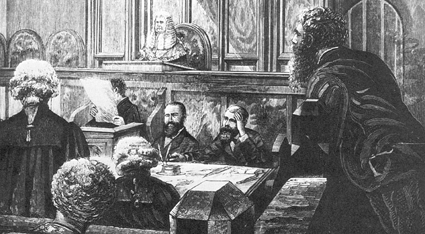
THE COURT-CRIER having called upon all to
observe a strict silence while the Judge pronounced the awful sentence of death:
his Honour said; "Edward Kelly, the verdict pronounced by the jury is one
which you must have fully expected."
The prisoner: "Yes, under the circumstances."
His Honour: "No circumstances that I can conceive could have altered the
result of the trial."
The prisoner: "Perhaps not from what you now conceive, but if you had heard
me examine the witnesses it would have been different."
His Honour: "The facts are so numerous, and so convincing, not only as
regards the original offence with which you are charged, but with respect to a
long series of transactions covering a period of eighteen months, that no
rational person would hesitate to arrive at any other conclusion but that the
verdict of the jury is irresistible, and that it is right. I have no desire to
inflict on you any personal remarks. It is not becoming that I should endeavour
to aggravate the sufferings with which your mind must be sincerely
agitated."
The prisoner: No: I don't think that; my mind is as easy as the mind of any man
in this world, as I am prepared to show before God and man.
His Honour: It is blasphemous for you to say that. You appear to revel in the
idea of having put men to death.
The prisoner: "More men than I have put men to death, but I am the last man
in the world that would take a man's life. Two years ago - even if my own life
was at stake - and I am confident, if I thought a man would shoot me - I would
give him a chance of keeping his life, and would part with my own; but if I knew
that through him innocent persons' lives were at stake, I certainly would have
to shoot him if he forced me to do so; but I would want to know that he was
really going to take my innocent life."
His Honour: "Your statement involves a cruelly wicked charge of perjury
against a phalanx of witnesses."
The prisoner: I dare say; but a day will come, at a bigger Court than this, when
we shall see which is right and which is wrong. No matter how long a man lives
he is bound to come to judgement somewhere, and as well here as anywhere. It
will be different the next time there is a Kelly trial; for they are not all
killed. It would have been good for the Crown had I examined the witnesses, and
I would have stopped a lot of the reward, I can assure you, and I don't know but
I won't do it yet if allowed.
His Honour: "An offence of this kind is of no ordinary character. Murders
had been discovered which had been committed under circumstances of great
atrocity. They proceeded from motives other than those which actuated you. They
had their origin in many sources. Some have been committed from a sordid desire
to take from others the property they had acquired; some from jealousy, some
from a desire of revenge, but yours is a more aggravated crime, and one of
larger proportions; for, with a party of men, you took arms against society,
organised as it is for mutual protection and for respect of law."
The prisoner: "That is how the evidence came out here. It appeared that I
deliberately took up arms, of my own accord, and induced the other three to join
me, for the purpose of doing nothing but shooting down the police."
His Honour: "In new communities, where the bonds of societies are not so
well linked together as in older countries, there is unfortunately a class which
disregards the evil consequences of crime. Foolish, inconsiderate,
ill-conducted, and unprincipled youths unfortunately abound, and unless they are
made to consider the consequences of crime, they are led to imitate notorious
felons whom they regard as self-made heroes. It is right, therefore, that they
should be asked to consider and reflect upon what the life of a felon is. A
felon who has cut himself off from all, and who declines all the affections,
charities, and all the obligations of society, is as helpless and as degraded as
a wild beast of the field; he has nowhere to lay his head; he has no one to
prepare for him the comforts of life; he suspects his friends, and he dreads his
enemies. He is in constant alarm lest his pursuers should reach him, and his
only hope is that he might lose his life in what he considers a glorious
struggle for existence. That is the life of an outlaw or felon, and it would be
well for those young men who are so foolish as to consider that it is brave of a
man to sacrifice the lives of his fellow creatures in carrying out his own wild
ideas, to see that it is a life to be avoided by every possible means, and to
reflect that the unfortunate termination of the felon's life is a miserable
death. New South Wales joined with Victoria is providing ample inducement to
persons to assist in having you and your companions apprehended; but by some
spell, which I cannot understand -- a spell which exists in all lawless
communities more or less, and which may be attributed either to a sympathy for
the outlaws, or a dread of the consequences which would result from the
performance of their duty -- no persons were found who would be tempted by the
reward or love of country, or the love of order, to give you up. The love of
obedience to the law has been set aside, for reasons difficult to explain, and
there is something extremely wrong in a country where a lawless band of men are
able to live for eighteen months, disturbing society. During your short life you
have stolen according to your own statements over 200 horses."
The prisoner: "Who proves that?"
His Honour: More than one witness has testified that you made that statement on
several occasions.
The prisoner: That charge has never been proved against me, and it is held in
English law that a man is innocent until proven guilty.
His Honour: "You are self-accused. The statement was made voluntarily by
yourself that you and your companions committed attacks on two banks, and
appropriated therefrom large sums of money amounting to several thousands of
pounds. Further, I cannot conceal from myself the fact that an expenditure of
50,000 pounds has been rendered necessary in consequence of acts with which you
and your party have been connected. We have had samples of felons, all of whom
have come to ignominious deaths. Still the effect expected from their punishment
has not been produced. This is much to be deplored. When such examples as those
are so often repeated society must be reorganised, or it must soon be seriously
affected. Your unfortunate and miserable companions have died a death which
probably you might rather envy, but you are not offered the opportunity."
His Honour then sentenced the prisoner to death in the usual form, ending with
the words, "May the Lord have mercy on your soul."
The prisoner: I will go a little further than that, and say I will see you there
when I go.






